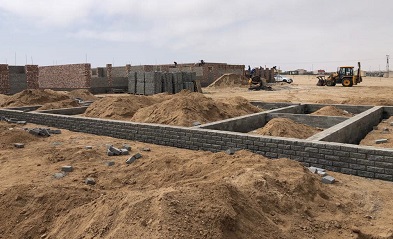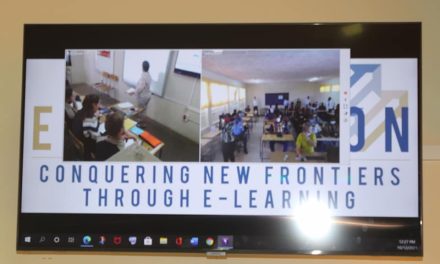
Poly’s FabLab to spark a manufacturing revolution

From the left are FabLab co-founders, husband and wife team, Bjorn and Kirstin Wiedow, Rector of the Polytechnic, Tjama Tjivikua, Minister of Trade, Hon Calle Schlettwein and Ambassador of the Federal Republic of Germany, H.E. Onno Hückmann.
Kirstin Wiedow, co–founder and Chief Creative of the FabLab said, “This idea started about five years ago after working in the Cape Town FabLab. Upon returning to Namibia, we saw a great need for this, to aid and assist our SME’s and entrepreneurs. In essence, it came out of a passion for helping people. In 2011 we did training with the Ministry of Trade and Industry for the Made in Namibia expo on product development. We also did a fair bit of training with the Namibia Business Innovation Centre(NBIC). It was after this that we began working with the Polytechnic to establish a FabLab. With the transformation into The Namibia University of Science and Technology, it is a showcase of technology for skills and knowledge transfer in Namibia,”
Bjorn Wiedow, co–founder and Chief Operations of the FabLab said “The idea was born in 2009/10 and it took a long time to get the idea recognised. Intensive research and development was conducted in 2012 including site visits to the FabLabs in Kenya and South Africa to develop the best model for our people. The partnership with the Ministry of Trade and Industry started in 2011 and was deepened in 2012/13 and, together with the Polytechnic’s rector’s support of the project it was made a reality in 2014, less than a year after funds were received. This included funding of a building in partnership with the German federal government, the GIZ PEG and Container World, Transworld Cargo.”
The FabLab was built with the context of Namibia in mind and is based on the premises of the Namibia Innovation Village, part of the NBIC. Apart from housing core ingredients which relate to equipment in FabLabs in other parts of the world, the local FabLab also has a unique design to differientiate it and make it stand out. This means that no two FabLabs are the same.
A series of containers houses the laboratory. The local FabLab comes equiped with a Laser Cutter, a 3D Scanner, a Manual Vacuum Forming Machine, and a Flat Bed Cutting Machine to name a few. The equipment allows users the possibility to make items ranging from prosthetic arms and legs to jewellery, engine parts, LED light enhancements and even the odd guitar.
The FabLab team said the public can apply for membership to make use of the FabLab. Five different options are available. Users can be classified as either manufacturers, experts, inventors, corporates and tinkerers. Tinkerers are users who would typically have no idea what to make but with the help of the FabLab staff choose from different tutorials and flex their creative muscles to come up with their own unique designs and inventions.
Corporates are companies that want to use the services of the FabLab or can use members of the FabLab to produce lines they need. Inventors are users who have innovative ideas for unique Namibian products or who have an idea to help solve local problems. Experts are the professionals who are experienced on the machinery, and manufacturers are SMEs registered with the Ministry of Trade and Industry in need of product development support.
FabLab’s plans for the year include various laser cutting, embroidery and labelling workshops. The most exciting is a youth development project called FabRoots, pioneered by the Lab Manager, Chongo Kasanda, aimed at sparking a science and technology frenzy in learners.
Said Wiedow, “The FabLab is a defined space, it’s not just random. It’s an open innovation environment and that means we encourage users to come up with anything they envisage. We are people centred. The vision is to have a FabLab in every region.”
The Rector of the Polytechnic, Prof Tjama Tjivikua threw his weight behind the project and said, “This is the future of Namibia, in fact, this is the future of this university. We are addressing the needs of this country. Technology, engineering and design are the future of this institution. We are in the right sphere.”
A total of N$7 million went into the venture through the partnership with the Ministry of Trade and Industry. Special provision was made to render services that registered SMEs need. The building was designed by the Wiedow founders and together with office furniture cost N$2.2 million. The project got off the ground with the support of Prof Tjivikua, Hon Calle Schlettwein, Minister of Trade and Industry, Pinehas Shinyala, Petrina Nakale, Frans Nekuma from the ministry and Lindi Mophuti from the South African FabLab Network.The funding of the building and its office furniture was sponsored by a partnership between the Federal Republic of Germany, GIZ PEG and Nobert Liebich of Container World/Transworld Cargo.














































